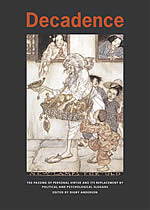Decadence

Decadence: The Passing of Personal Virtue and its Replacement by Political and Psychological Slogans
by Digby Anderson, 2005Britain, Europe and the United States are decadent societies in a special sense of that word. They have traded in an old morality that served them well throughout their civilisation for a new, experimental quasi-morality. The old morality had well-known virtues, courage, love, fairness, honesty and prudence. The new ‘virtues’ are equality, anti-discrimination, environmental concern, self-affirmation, a ‘caring’ attitude, and a critical mindset.
The old were genuine virtues; they required specific behaviours of individuals. The new are quasi or bogus virtues. Some, such as equality, are political policies rather than features of personal conduct. Environmentalism is an arena in which virtue may be exercised not a virtue themselves. Transparency in business is a way of revealing virtue not a virtue. Some are slogans: they make rhetorical appeals to moral indignations. Others such as self-affirmation would once have been regarded as a vice.
One of the best known bad exchanges is that of Aladdin’s lamp. Aladdin’s princess wife, not knowing his old, dusty lamp is a magic one is persuaded to exchange it for a bright new one. The exchange of a dusty, old but well-proven morality for a bright, new quasi-morality is an even worse deal. This book shows how good the old one was and how empty the glittering new one is. But there is something worse than the new set of quasi-virtues, and that is the exchange itself. The princess gave away Aladdin’s lamp in ignorance of its magic powers. Our society has given up its priceless set of virtues in the face of ample evidence of their goodness and practicality. Indeed, it may be that it is this very goodness with which society is so uneasy. A shiny bauble morality is so much easier to live with.
<< Home